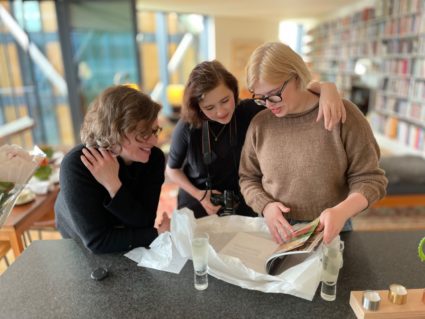the Turner Prize turns my head

Everyone who knows me right now knows me as a wife, mother, cook and writer. Which is fine (our favorite catch-all phrase of derision this summer!). And normally I feel entirely encompassed, described and encapsulated by these terms.
And then every once in awhile I go to an art event that knocks me upside the head and says, “You, there with the PhD! Remember us, the art world? We used to occupy most of what’s known as your mind. Wake up.”
Sunday was one of those days. To participate in the London Restaurant Festival (and yet not spend £50 per person, for example for the Roast Lunch that sounded incredibly tempting), I ordered tickets for the three of us to see the “Turner and the Masters” show at the Tate Britain (the “real Tate” as I think of it, as opposed to the Modern), and we’d have lunch included, at the Rex Whistler Restaurant as part of the afternoon. Fair enough.
Do you ever have the feeling, when you’ve planned an outing that no one else feels particularly enthused about, that the success or failure of the ENTIRE EVENT is on your shoulders? Forget the chefs at the restaurant, or even dead and buried Turner and his cohorts. The food and the paintings were on MY shoulders! It strikes me as emininently ridiculous that after 20 years of marriage and nearly 13 years of motherhood, I should be shaking in my boots hoping John and Avery had a good time. But that’s me.
So the lunch was… adequate. Parsnip soup (too much of it and it needed a garnish), John had mixed steamed mussels and clams, perfectly… adequate. Then I had a tasty piece of salmon atop a giant quenelle of so-so mash, and a nice langoustine sauce. John had a truly vile-looking steamed mutton pudding — what was he thinking? On a bed of lentils. So wet brown stuff on a pile of wet brown stuff. But he ate it all and reported it to be perfectly edible. Avery had a dish of pasta with a mascarpone and sage sauce, and about four pieces of butternut squash, which was FINE because she doesn’t like squash. But if she did, she’d be a tad disappointed.
The room itself is such a throwback: murals of ancient people hunting for, the caption in the menu informed me, “rare meats.” Meats like gazelle, leopard and mountain lion. And we chatted, in that way people do who spend a lot of time together, but always at home. Out of captivity, as it were, we broached unfamiliar topics like architecture, fashion and GCSEs, and I breathed a sigh of relief for at least the first part of the afternoon. Lunch had been nice. Adequate.
The Turner show itself was the ultimate in academic curatorial splendor: quite literally one painting next to another, one a Turner and one by someone Turner either idolized or resented or some Freudian combination of both. We stood solemnly in front of these endless pairs (Poussin, Canaletto, Constable, etc., etc.) and looked from one to the other like fans at a tennis match. Then we each said, “I like the Turner better.” The late Turners were, of course, quite inspiring, edging as they were away from Romantic sort of sickliness and toward a hint of Impressionism’s gloriously misty palette and suggestive atmosphere. We felt educated. And tired.
Then we thought, “We’re here: why not visit the rooms containing the finalists for the Turner Prize?” The actual winner will be announced in December, but the finalists for this prize (thoughtfully named for Turner himself, who must have felt quite full of himself by this point in the afternoon) were displayed in a series of enormous galleries off the Sackler rooms. And, dear readers… I fell into quite a deep hole of what I can call only “gallery envy.”
Some of my longtime readers may remember my visit nearly three years ago to a most inspiring gallery in Notting Hill. Friends who have known me even longer will definitely remember my past identity as Gallerista Extraordinaire, or at least Gallerista Enthusiastista. I did. I owned an art gallery in Tribeca. How I adored it. The total autonomy, the ultimate responsibility for everything that appeared on the walls and in the catalogue essays, the sense that the buck stopped with me, no doubt.
In fact, only too literally. The buck, I mean. Because the flip side of all that autonomy and responsibility was just that. It was all on me. And although I was one hell of a curator, and educator, and sales person, I was a Rotten Businesswoman. And I lost money. Or rather, I made a great deal of money, but I spent even more to do it.
Most of the time I bury these memories under a thick, delicious layer of garlic and olive oil, sprinkled with a little Lost Property and a side of happy marriage. But then, I go to the Tate and see the Turner Prize finalists, and all I can think is, “I want to buy everything I see, or else I want to show it in a gallery and get other people to buy it.” The pieces were all (or nearly all) so very ME. By which I mean, crazy materials (pulverized jet engine? dessicated bovine brain matter mixed with plastic? coal dust, resin and whale skeleton? sure!), insanely complex and labor-intensive process, repetitive, obsessive-compulsive installations. All laid over with a serenity and beauty that lives quite happily with the mind-boggling truth behind the objects. Bovine brains, truly.
I will not spoil the surprise of the show for you. I will say that there was one artist among the four that I felt did not belong AT ALL. Avery, John and I chose different objects in our eternal “what would you buy?” dialogue. If we still called an enormous Tribeca loft home, I know what I would have bought: 26 upright sort of skittles (one for every letter of the alphabet) with five mysteriously taken out of the arrangement and laid to one side. Why, what might they spell? Sublime mytery.
So I floated home in a miasma of memories of my own beloved gallery, filled month after month with shows that fulfilled my aesthetics, my desire to write about silent objects, the fun of finding homes for lovely works of art with lovely people. How I loved it all.
And then this morning, John said, “Did you notice that the florist who went out of business has a “To Let” sign in the window?” OH DEAR.
Someone stop me. John isn’t even saying no. I’ve peered in the darkened windows, imagined the shelves and cubbyholes taken away and the wallpaper painted over in stark, perfect white. I’ve mentally rung up all my old art-world acquaintances: the critics, the curators, clients, writers and installers, and set up shop.
Someone b***dy stop me.
For the moment, I’m merely dreaming. And anyway, if I did open a new gallery, when would I have time to cook? And if I didn’t have time to cook, when would I make:
Lick the Bowl Potatoes
(serves 4)
6 medium potatoes, any kind at all, peeled
4 tbsps olive oil
1 tbsp butter
Maldon salt and fresh-ground pepper
heaping teaspoon sweet Paprika
Cut peeled potatoes into bite-size wedges and place in a saucepan with cold water to cover. Add enough salt to fit in your cupped palm. Bring to boil and simmer high for about 15 minutes or until potatoes are easily pierced by a fork. Drain into a colander. Place colander on hot burner (heat turned off) and leave for a half hour or so, while you do other things. The idea is to dry them out completely.
When you’re about 8 minutes away from wanting to eat, heat olive oil and butter in a very large skillet. Add salt and pepper. Heat until the oil and butter “stop talking to you,” as Julia Child would say. That is, the bubbling settles down to silence. Add potatoes. Stir continually, turning the potatoes over and they brown. Sprinkle on most of the paprika (retaining a dusting for the end).
Amazingly, the potatoes will not retain the oil and butter. At the end of cooking, when the potatoes are lightly browned and lightly crisped, simply tilt the skillet and pull the potatoes out with a slotted spoon, leaving the oil behind. Magic.
**************
Avery exercised miraculous, most unteenager-like restraint when these were brought to the table (all right, I’ll confess, brought to the floor: we were eating in front of the television, sue me). “You guys help yourselves, because if I go first, I’ll be too piggy.” We took sort of average portions. She ate her beets, she ate her sublime cheeseburger with Devon cheddar. She eyed the potatoes. She took a helping. Another few snaked their way onto her plate. They were gone.
“May I lick the bowl, Mommy?” What mother, what cook, would say no?
Time will tell if anything comes of my ambitions, frothing up right now like yeast in a bowl waiting for flour. It was all such fun, wasn’t it? Every day there were magnificent, heart-stopping dramas, every person who came in the doors was a potential gold mine of sales, reviews, new artwork to see. I’m certainly in a glass-half-full mood, because in reality, every person who came through the door was very likely a complete nutcase, as happens when one deals with the General Public. But it was ALIVE.
Someone stop me.

